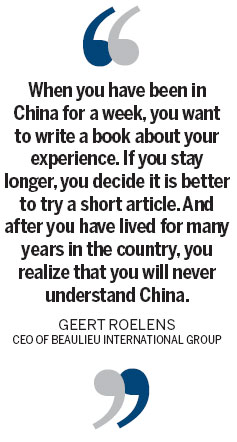Advice about China on a plate
Updated: 2013-12-20 10:07
By Tuo Yannan (China Daily Europe)
|
|||||||||||
Businessman reckons success comes as easily as learning to use chopsticks
Succeeding in China is no more difficult than mastering chopsticks so you can eat various Chinese dishes elegantly and in a relaxed way, says Geert Roelens.
"Getting close to strange Chinese food is the same as getting close to business," says Roelens, CEO of Beaulieu International Group, which makes floor coverings and fabrics, and author of How Successful Can You Be in China? A Recipe for Success.
Roelens, 58, worked for a Belgian steel company in Shanghai from 2003 to 2008, and says he developed a very personal way of working in a country more than 300 times the size of his homeland.
After first visiting the country in 1992, the longer he spent there the more he realized there was a lot more he needed to learn about it, he says.
In his book, published in September, he says: "When you have been in China for a week, you want to write a book about your experience. If you stay longer, you decide it is better to try a short article. And after you have lived for many years in the country, you realize that you will never understand China."
In the book, Roelens expounds on how to do business in China, drawing on his personal experience. He lays out his understanding of the Chinese government's policies and explains how to shift from a European mindset to a Chinese one.
Roelens says that from the very beginning he read voraciously about doing business in China, mostly from voluminous tomes. On a flight to China he came up with the idea for a book that would fit in the jacket pocket of a business suit.
The book, which took two years to write, can easily be read on an eight-hour flight from Europe, he says.
Patrick Nijs, former Belgian ambassador to China, says of the book: "Geert understands China through and through, and he wants to share his insights with fellow businessmen wishing to decipher the mysteries of success in China."
For Nijs, Roelens' message boils down to this: "Engage with the Chinese people without prejudice and with respect and trust; one might even say with friendship and love. This commitment, being sincere without being blind or unconditional, is one of the keys to success."
The first thing with China is that you have to experience it yourself rather than through a book, television or another person, Roelens says. However, for a foreigner, China can be perplexing.
On the book's cover is a big black question mark, which he says "represents the mystery sometimes the confusion of China. Even though there will be many question marks, you should be confident about the place. You shouldn't be afraid of all the question marks. They will slowly disappear."
His advice to newcomers is to "not only work, but visit". To get to know the country in the fastest way, to erase question marks, as a foreigner you have to visit Chinese shops, pay one or two yuan to take a bus or the subway, to become a part of Chinese life, "not only on the business side, but also on the human side".
With that kind of experience, those who can live with Chinese ways of doing things will take the next step in doing business in China, he says.
Roelens, who won the Friendship Award in China in 2009 (presented by Zhang Dejiang, now chairman of the Standing Committee of the National People's Congress), describes "seeing and feeling" China as one of his seven recipes for success.
Another is "being handy with chopsticks", the chopsticks referring to the Chinese people.
Appreciating Chinese food and dining with Chinese people is crucial to a successful relationship with the country, he says. However, when he first went to China he was shocked by what he thought was the strange food and its strange ingredients.
"It is very easy to say no to food you have never seen before."
If someone has recommended a dish you do not know, you should try it, he says. Then you will find it is just like new business opportunities in China, waiting for you to explore them.

Every time Chinese friends coaxed him into trying new food, their passion in persuading him to do so was similar to doing business in China, he says.
"The more you adapt to Chinese food, the more you listen to people with an open mind, the easier for you to build good relationships with people".
At first, Roelens says, he was often offered knives and forks in restaurants, but insisted on using chopsticks.
As with using chopsticks to pick up all kinds of food from different kinds of dishes, you have to appreciate and listen well to people to connect the elements for being successful in China, he says.
Unlike in European management, in China you not only need to have good relationships with people but to play multiple roles. He or she is not only a manager, but also a leader, a decision maker, a coach, a personal adviser and a friend.
"Have tea together, travel together, share backgrounds," Roelens says. "Differences are very easy to be found, but if you look for the similarities, you will get much closer to Chinese people".
With Chinese employees, you also need to show your confidence in them, he says. One of his early experiences in China was being upset about Chinese employees talking earnestly to one another in their own language but remaining silent when he spoke English to them.
Now, he says, he will leave the room for half an hour and let Chinese employees talk about a matter among themselves.
"It's important to know when to stay away. Don't interfere because they are all clever enough to come up with a result eventually."
The most significant one is the fast-paced work. In 2005 his company was building a factory in Shenyang, Liaoning province, in China's northeast. Winter had arrived early, he says. Whereas construction workers in Europe would down tools in such conditions, he says, Chinese builders routinely burn bamboo to keep concrete warm, aiming to meet deadlines.
That industriousness, compared with construction in Europe, which can be very slow, surprised him, he says. After having got used to the fast pace and efficiency of Chinese work, he has managed to adapt it into his Belgian company, where it works well, he says.
For people who will enter the huge Chinese market, Roelens suggests: "You can easily be disappointed in China as a result of misunderstandings, different perceptions of time, incomprehensible translations and initiatives that get out of control. However, you can overcome all of these things; you should never give up. Always give it another try, a different look, a new approach."
tuoyannan@chinadaily.com.cn
|
Geert Roelens has advice for those wanting to enter the Chinese market on how to shift from a European mindset to a Chinese one. Provided to China Daily |
(China Daily European Weekly 12/20/2013 page29)
Today's Top News
Chinese merchant killed during robbery in Russia
IPR courts 'would be helpful'
Liaoning's combat capability tested
GM corn rejection not to hurt market
US aircraft hit by gunfire in South Sudan
Memorials mark Lockerbie attack
H5N2 outbreak confirmed in N China
China's moon rover works stably
Hot Topics
Lunar probe , China growth forecasts, Emission rules get tougher, China seen through 'colored lens', International board,
Editor's Picks

|

|

|

|

|

|






